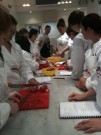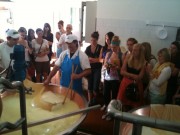MU Students Embrace Mediterranean Diet and Lifestyle
Study Abroad Program Takes Students to France, Greece and Italy to Learn the Importance of Eating Locally Produced Food and Incorporating Physical Activity into Daily Routines
September 20th, 2011
COLUMBIA, Mo. – It is well known that the U.S. is facing an obesity epidemic; nearly two-thirds of the population is overweight or obese, according to the Centers for Disease Control and Prevention. Being overweight or obese increases the chances of developing chronic diseases. Research has linked the Mediterranean diet and lifestyle to longer lives and decreased risk of heart disease and other life-threatening illnesses. A University of Missouri program allows students to experience the health benefits of Mediterranean living while studying abroad in France, Greece or Italy.

Participants in the Italy program learn how to make a nutritious meal during a cooking lesson with the chef of the Florentine soccer team.
The heart-healthy Mediterranean diet incorporates whole grains, fruits, vegetables, olive oil, dairy, fish, nuts and legumes and emphasizes eating regional food. Daily physical activities such as walking and bicycling are common features of the Mediterranean lifestyle.
“Learning about the Mediterranean diet and lifestyle is important because it emphasizes getting back to basics,” said Ann Cohen, associate state nutrition specialist for MU Extension and the Department of Nutrition and Exercise Physiology in the College of Human Environmental Sciences, who leads the Mediterranean Diet and Lifestyle study abroad program in Italy. “Students learn about the importance of taking the time to cook meals with organic, locally produced food and incorporating physical activity into their daily routines.”
Participants in the Italy program travel throughout the Tuscan region to visit food production facilities where they observe the making of parmaggiano reggiano cheese and balsamic vinegar. Students shop at local markets and prepare their own meals. Class topics include sustainable farming and nutritious cooking and enhance the students’ cultural experiences. Participants also learn about the slow-food movement, a grassroots cause that began in Italy in opposition of easily available, high-fat fast food. The slow-food movement is focused on enjoying the entire meal process by eating meals with friends and taking time to cook.

Students observe the process of making parmaggiano reggiano cheese at a production facility in Parma, Italy.
While abroad, students use pedometers to monitor their physical activity levels and number of steps taken. When they return to the U.S., the students compare their daily steps taken in Europe to their daily steps taken in the U.S. Many participants have noted dramatically increased activity levels while they studied abroad.
“In Italy, everything is within walking distance, so students have many opportunities to be active,” Cohen said. “Many students make goals to maintain active lifestyles once they return to the U.S. and share their experiences with others.”
The Mediterranean Diet and Lifestyle program is part of Mizzou Advantage, the five unique areas that set MU apart from other universities. The project contributes to the “Food for the Future” initiative that capitalizes on MU’s strengths in plant and animal sciences, its emerging research on aging, obesity and chronic disease, and its food-related work in the arts, humanities and social sciences.
To learn more about the study abroad program, please visit http://extension.missouri.edu/hes/studyabroad/.


